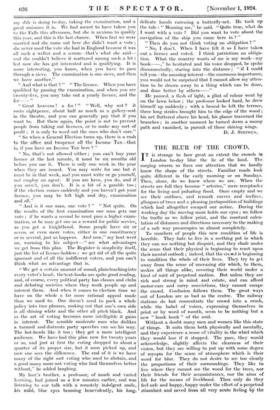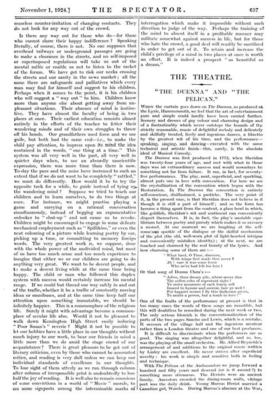THE BLUR OF THE CROWD.
IT is strange to how great an extent the crowds in London to-day blur the lie of the land. The surging swarm so fixes our attention that we hardly know the shape of the streets. Familiar roads look quite different in the early morning or on Sundays. Then, alone, do we know where we are. When the streets are full they become " arteries," mere receptacles for the living and pulsating flood. Once empty and we see their outlines, and remark curves and inclines, glimpses of trees and a pleasing juxtaposition of buildings which had altogether escaped our notice. During the working day the moving mass holds our eyes ; we follow the traffic as we follow print, and the constant calcu- lation of distances and directions necessary to the making of a safe way preoccupies us almost completely.
To numbers of people this new condition of life is horrible. They hate to live in a seething pot in which they can see nothing but disquiet, and they chafe under the sense that their physical is beginning to react upon their mental outlook ; indeed, that the crowd is beginning to condition the whole of their lives. They try to get away from the sense of unceasing stir which, to them, makes all things alike, covering their world under a kind of mist of perpetual motion. But unless they are rich and strong in mind and estate, and can afford motor-cars and carry convictions, they cannot escape the crowd. Confusion follows them. The great ways out of London are as bad as the centre. The railway stations do but concentrate the crowd into a crush, while the babel of voices, expressing themselves in print or by word of mouth, seem to be nothing but a new " honk honk " of the soul.
Without a doubt many men and women like this state of things. It suits them both physically and mentally, and they experience a sense of vitality in the whirl which they would lose if it stopped. The pace, they would acknowledge, slightly affects the clearness of their vision, but they are willing to put up with some degree of myopia for the sense of atmosphere which is their word for blur. They do not desire to see too clearly the proportions of their surroundings. They like to live where they cannot see the wood for the trees, nor their friends for their acquaintances, nor the aims of life for the means of livelihood. Thus only do they feel safe and happy, happy under the effect of a perpetual stimulant and saved from all very acute feeling by the ceaseless counter-irritation of changing contacts. They do not look for any way out of the crowd.
Is there any way out for those who do—for those who cannot share their happy indifference ? Speaking literally, of course, there is not. No one supposes that overhead railways or underground passages are going to make a clearance in the streets, and no self-imposed or superimposed regulations will take us out of the mental melee or enable us not to listen to the racket of the forum. We have got to risk our necks crossing the streets and our sanity in the news market ; all the same there are safeguards and palliatives which every man may find for himself and suggest to his children. Perhaps when it comes to the point, it is his children who will suggest a " way out " to him. Children know more than anyone else about getting away from un- pleasant situations. Their absence of mind is instinc- tive. They have almost the faculty of being in two places at once. Their earliest education consists almost entirely in the efforts of the teacher to fetter their wandering minds and of their own struggles to throw off his bonds. Our grandfathers used force and we use guile, but both had the same end—i.e., to make the child pay attention, to impress upon its mind the idea contained in the words, " one thing at a time." This system was all very well in the past, all very well in quieter days when, to use an absurdly unscientific expression, there was more time than there is now. To-day the pace and the noise have increased to such an extent that if we do not want to be completely " rattled," we must do differently. How would it be to try the opposite tack for a while, to guide instead of tying up, the wandering mind ? Suppose we tried to teach our children and to learn ourselves, to do two things at once. For instance, we might practise playing a game and carrying on a rational conversation simultaneously, instead of begging art argumentative onlooker to " shut-up " and not cause us to revoke. Children might be encouraged to engage in some delicate mechanical employment such as " Spillikins," or even the neat colouring of a picture while learning poetry by ear, picking up a tune, or committing to memory foreign words. The very greatest work is, we suppose, done with the whole power of the undivided mind, but most of us have too much sense and too much experience to imagine that either we or our children are going to do anything very great. We want to be decent people, and t) make a decent living while at the same time being happy. The child or man who followed this duplex system with success would certainly increase his mental range. If we could but thread our way safely in and out of the traffic, whether it be a traffic of constantly moving ideas or omnibuses, and at the same time keep half our attention upon something immutable, we should be infinitely happier. This is a commonplace of the religious life. Stirely it might with advantage beCome a common- place of secular life also. Would it not be pleasant to walk down Kensington High Street easily inducing " Poor Susan's " reverie ? Might it not be possible to let our hobbies have a little place in our thoughts without much injury to our work, to bear our friends in mind a little more than we do amid the stage crowd of our acquaintance ? There is great pleasure to be got out of literary criticism, even by those who cannot be accounted critics, and reading is very dull unless we can keep our individual standards of excellence in our thoughts. To lose sight of them utterly as we run through column after column of irresponsible print is undoubtedly to lose half the joy of reading. It is well also to remain conscious of some convictions in a world of " Movie " morals, to 4ee some signposts among the interminable marks of interrogation which make it impossible without such direction to judge of the way. Perhaps the training of the mind to absent itself in a profitable manner may . militate somewhat against success in life, but for those who hate the crowd, a good deal will readily be sacrificed in order to get out of it. To retain and increase the child's privilege of a mind in two places at once is worth an effort. It is indeed a prospect " as beautiful as a dream."











































 Previous page
Previous page